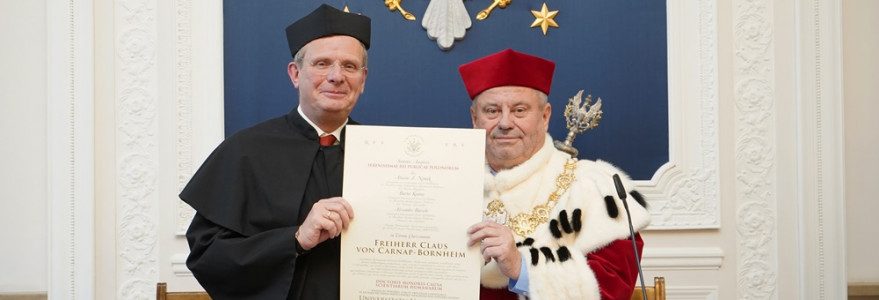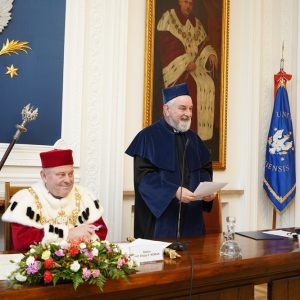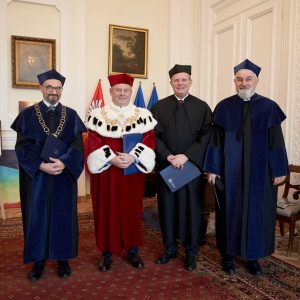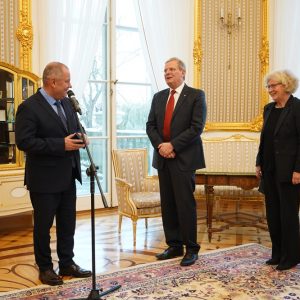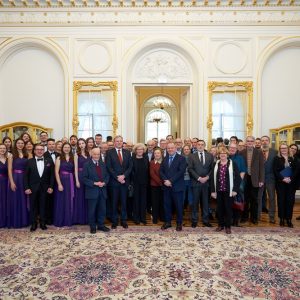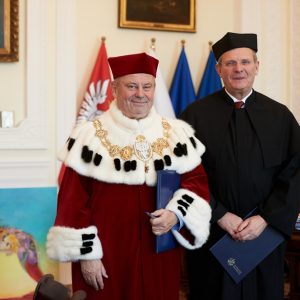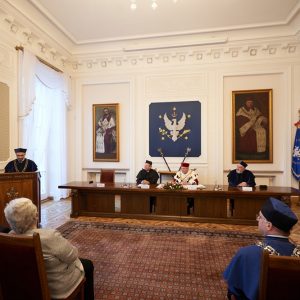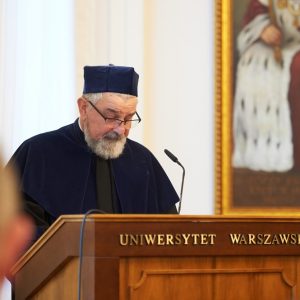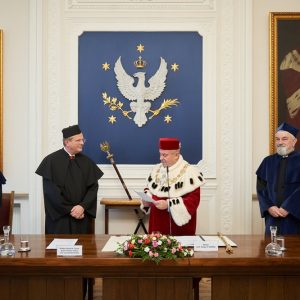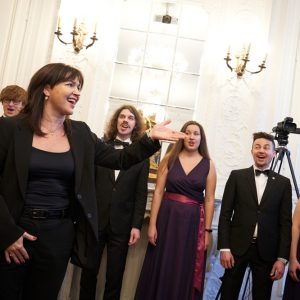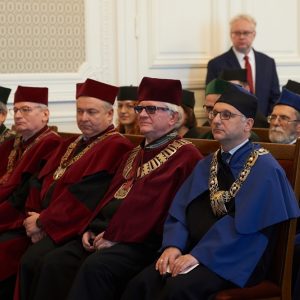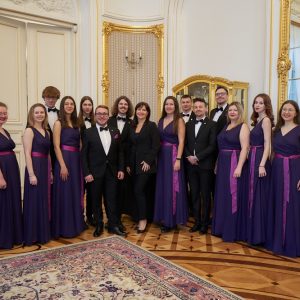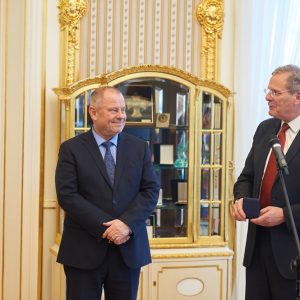Prof. Freiherr Claus von Carnap-Bornheim, a researcher of the Roman period, was awarded an honorary doctorate by the University of Warsaw. The ceremony to confer the title took place on 5th December at Kazimierzowski Palace.
“Today, the University of Warsaw is hosting a distinguished researcher who is known not only in Germany and Poland, but also worldwide. The title of doctor honoris causa of the University of Warsaw is awarded to individuals who have both made significant contributions to science and have been involved in cooperation with scholars, doctoral candidates and students of our University. Prof. Freiherr Claus von Carnap-Bornheim is one such person. Now, he becomes a member of the academic community of the University of Warsaw,” Prof. Alojzy Z. Nowak, the Rector of the University of Warsaw, said during the ceremony of conferring the title of doctor honoris causa on Prof. Freiherr Claus von Carnap-Bornheim.
“I would like to express my deep gratitude for the distinction conferred on me by the University of Warsaw. There are certainly not many events in the academic life of a humanist that can be compared to receiving a prestigious honorary doctorate. On the one hand, this distinction is an appreciation of my academic past, but on the other hand, it is also a promise of future cooperation between the University of Warsaw and my scientific community,” Prof. Freiherr Claus von Carnap-Bornheim emphasised during his speech.
The laudation was delivered by Prof. Aleksander Bursche from the Faculty of Archaeology of the University of Warsaw.
“Prof. Freiherr Claus von Carnap-Bornheim is an outstanding archaeologist, researcher, educator, organiser and populariser of science with a world-wide reputation and close connections to the Polish school of archaeology and the University of Warsaw. His family comes from Janczewo near Gorzów Wielkopolski. To his mother – a native of Copenhagen – he owes a good command of the Danish language, which had a considerable impact on his further career,” Prof. Bursche said, adding: “The scientist honoured today worked as an associate professor at the prehistoric seminary in Marburg in the first half of the 1990s. He had the opportunity to visit Poland several times, including a six-month internship at the Jagiellonian University and at our Alma Mater. He taught at both universities. At that time, on von Carnap’s initiative, as part of the Polish-German youth academic exchange, we carried out scientific tours of western Germany and northern Poland. It was a very brave and, at the same time, extremely successful experiment for those times. In addition to the acquaintanceships and friendships that were established and continue to this day, many of the participants of these tours are well-known and successful archaeologists, some of which are present in this room.”
Distinguished archaeologist
Prof. Freiherr Claus von Carnap-Bornheim specialises in the archaeology of central and northern Europe of the first millennium AD. In his work, the archaeologist focuses mainly on three areas: the armament of the barbarian communities, sacrificial sites in Scandinavian armed conflicts of the first centuries AD, and issues related to the identification of the tribal elites of that time. He has analysed the social differentiation and the formation of barbarian elites (the burial of King Childeric I, specimen graves from Mušov), issues of conflict and battlefields (Kalkriese – the site of the defeat of Varus in the Teutoburg Forest in AD 9), as well as cultural centres and peripheries. Recently, he has researched an emporium from the Viking period at Haithabu and Danewerk – a system of medieval marsh fortifications across the Jutland Peninsula. Thanks to his efforts, Haithabu and Danewerk have been included in the UNESCO World Heritage List.
Prof. Freiherr Claus von Carnap-Bornheim completed his studies at the University of Marburg, where he also defended his doctoral thesis on goldsmiths’ wares from swamp finds in southern Scandinavia and a habilitation thesis “Studies on the Younger Roman Period in Barbaricum”. He obtained the title of professor at the Christian Albrecht University of Kiel. The archaeologist is an author or a co-author of 180 publications, and an editor or a publisher of more than 30 monographs.
World-renowned science organiser
Prof. Freiherr Claus von Carnap-Bornheim is associated with the scientific, museum and conservation institutions of the federal state of Schleswig-Holstein. Since 2009, he has been the director of the Schleswig-Holstein State Museum Foundation at Gottorf Castle.
One of his greatest successes is the creation and management of the Centre for Baltic and Scandinavian Archaeology. The unit conducts research in Northern, Central and Eastern Europe – from the Stone Age to the Middle Ages. The centre also cooperates with Polish archaeologists, including those from the University of Warsaw. The researchers from both institutions have been involved in carrying out scientific projects concerning, for example, the imitation of Roman medallions or finds of Roman coins from sambar cemeteries. The research resulted in joint publications. As part of the academic exchange, Prof. Freiherr Claus von Carnap-Bornheim hosted many UW employees as well as students and doctoral candidates.
The archaeologist is an internationally respected researcher. For his service, he has been awarded, among others, the Royal Order of Knights by Carl XVI Gustaf, King of Sweden, the Order of the Dannebrog by Margrethe II, Queen of Denmark, and
Order of Merit of the Federal Republic of Germany by the President of Germany. He holds an honorary doctorate from Eötvös Loránd University in Budapest.



